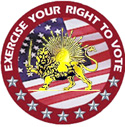Americano-Iranian Style Democracy
 |
Iran has a unusual political system. On the one hand, it has a very long tradition of voting, dating back to the promulgation of its first modern constitution in 1906.
On the other, for most of that past century, there has been some kind of filtering process. First, there was the monarchy - Reza Khan and then his son, Mohammed Reza Shah. Later, after the shah's downfall, a rather different system emerged. A supreme leader is selected on the basis of his Islamic scholarship; he heads a Guardians' Council composed of Islamic scholars. All candidates for political office must be approved by the Council on the basis of adherence to approved interpretations of Islamic doctrines and all decisions of the elected government are subject to potential review by the Council on the same grounds.
With that very large caveat, Iran has a democratic political process, with universal suffrage from the age of 15.
This doesn't sound very democratic, and yet, I am struck by a certain parallel to our system.
The tenets of laissez-faire free market capitalism play roughly the role in our system that Khamenei's interpretations of sharia play in theirs. Instead of a Guardians' Council, we have an amorphous, self-appointed group of big funders who decide whether a candidate is financially viable; for presidential elections, we also have a commission that was set up to keep all the other candidates out of the nationally televised debates.
And, while the president can apparently do whatever he wants when it comes to foreign policy, major attempts at domestic legislation almost always have to gain approval from unappointed corporations. Even Bill Clinton's very non-subversive attempt at universal health-care could get nowhere because it was ruled a violation of the insurance companies' creed.
In the United States, mechanisms of exclusion are mostly informal and hidden behind a veneer of free choice, while in Iran they appear carved in imperishable stone. Actually, both may be similarly malleable. It would take massive popular mobilizations to break out of this system of exclusion here; a similar level of mobilization in Iran might well force even conservative clerics to moderate their interpretation of religious doctrines.
In both cases, it's really a question of degree more than one of rock-hard principle.
Iran has taken a very undemocratic turn recently. Out of over 1000 candidates for president, all but six were rejected by the Guardians' Council. Later, at Khamenei's insistence, they reinstated the reformist candidate Mostafa Moeen and a few others.
Once the Council reversed itself, and even without including real reform candidates like Reza Khatami, the main candidates offered a far wider range of viable political choices than did the last American election.
The front-runner, with 21%, is former president Hashemi Rafsanjani, generally called a moderate, but who calls himself a "fundamentalist reformer." Second, with 19.5%, is Mahmoud Ahmadinejad, a former Revolutionary Guard and a hard-line conservative who has much support among the poor. Three other candidates got double-digit percentages, with Moeen coming in fifth.
The runoff will include only the first two - the fundamentalist reformer vs. the fundamentalist with no hint of reform about him. Sounds like Bush vs. Kerry.
Harsh as the Guardians' Council filter is, at least with regard to political range, it doesn't compare with the filter imposed by the two-party system. You could say we don't need that range here because people don't have the range of political views they have in Iran, and you wouldn't exactly be wrong; but there is a pretty obvious chicken-and-egg problem here.
This was a rather undemocratic election, certainly as compared with those in 1997 that first ushered in Mohammad Khatami, the current president. And yet it can still be compared with our last election. It's true that there are allegations of vote-tampering in the Iranian election; of course, that couldn't happen here.
One last set of comparisons. The United States wins hands-down when it comes to protection of individual civil rights; no contest from Iran. On the other hand, here's another index of democracy: ability to criticize the head of state to his face. Last year, on Student Day at Teheran University, Khatami was heckled and forced to account for his capitulation to the hard-line clerics; he defended himself feebly and entreated students not to heckle. If you can imagine that happening to Bush, or even Clinton, you're living on a different planet.
Rahul Mahajan is publisher of the blog Empire Notes and teaches at New York University. He has been to Iraq twice and reported from Fallujah during the siege in April.
Related Suggestions
I think Iran is the best country to live in on this planet earth. Right now.
Salute to imaam Khomeni and to the brave irani nation.
May Allah Bless them and their future generations to come. Ameen.
Scrap this watered down website and check out some real news.....Asalaamualaykum
www.islamicdigest.net
www.iribnews.ir
www.baabeilm.org
www.khamenei.ir
Standing for a few minures in front of a Diebold electronic voting machine and pressing our chosen candidates names on a touch screen should not be mistaken for Democracy. What meaning does this act have when the winning candidate merely uses his public trust to further the twin interests of Israel and the corporations at the expense of Americans? No, democracy would be a nice thing to have in America...

















